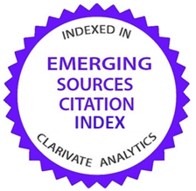La seguridad regional y el papel de los Estados débiles. Una aproximación teórica
DOI:
https://doi.org/10.21830/19006586.233Palabras clave:
seguridad regional, Estados débiles, viejo regionalismo, nuevo regionalismo, Complejos Regionales de SeguridadResumen
En este artículo se presenta un panorama de las principales tendencias teóricas en estudios de seguridad regional. Con esto en mente, el artículo comienza con una revisión histórica del viejo regionalismo, caracterizado por un mundo bipolar. Luego se presenta la idea general del nuevo regionalismo, tomando como marco referencial la teoría de la transición de poder de Organski (Organski 1958; Organski, Kugler & Fox, 1980) y el neo-funcionalismo de Haas (1964; 1990), para terminar en el enfoque de la teoría de los complejos regionales de seguridad (TCRS) de Buzan & Wæver (2003). El artículo concluye que la TCRS, junto con el concepto de externalidad de Lake (2001) y las miradas inductivas de investigadores como Ayoob (1989; 1995), permiten una mejor comprensión de la relación entre Estados en vías de desarrollo, la región y el sistema internacional.
Descargas
Referencias bibliográficas
Acharya, Amitav (2007, July). The Emerging Regional Architecture of World Politics, World Politics, 59(4), 629-652.
https://doi.org/10.1353/wp.2008.0000
Ayoob, Mohammed (1989, March). The Third World in the System of States: Acute Schizophrenia or Growing Pains? International Stuties Quarterly, 33(1), 67-79.
https://doi.org/10.2307/2600494
Ayoob, Mohammed (1995). The Third World Security Predicament. State Making, Regional Conflict and the International System. Londres: Lynne Reinner.
PMid:7767820
Austin, John (1961/1995). Emisiones Realizativas. En: Valdés, Luis (Ed.). La Búsqueda del Significado. Madrid: Editorial Tecnos, pp. 415-430.
Bach, Daniel (2009). Régionalisme, Régionalisation et Globalisation. En: Gazibo, Mamoudou; Thiriot, Céline (Ed.). L'Afrique en Science Politique. Paris: Karthala.
Barbé, Esther (2007). Relaciones Internacionales. Madrid: Tecnos.
Buzan, Barry (1983). People, States and Fear. The National Security Problem in International Relations. London: Wheatsheaf Books.
Buzan, Barry & Little, Richard (1994). The Idea of "International System": Theory Meets History. International Political Science Review, 15(3), 231-255.
https://doi.org/10.1177/019251219401500302
Buzan, Barry; Wæver, Ole & de Wilde, Jaap (1998). Security: A new framework for analysis. Boulder: Lynne Rienner.
Buzan, Barry & Wæver, Ole (2003). Regions and Powers. The Structures of International Security. Cambridge: Cambridge University Press.
https://doi.org/10.1017/CBO9780511491252
Couceiro-Bueno, Juan Carlos (2010). Europa Ante Sí Misma. Madrid: Bliblioteca Nueva.
Dessler, David & Owen, John (2005, September). Constructivism and the Problem of Explanation: A Review Article. Perspectives on Politics, 3(3), 2005, 597-610.
Deutsch, Karl W. (1953, January). The Growth of Nations: Some Recurrent Patterns of Political and Social Integration. World Politics, 5(2), 1953. Pg168-195.
Deutsch, Karl W. (1980). Political Research in the Changing World System. International Political Science Review, 1(1), 23-33.
https://doi.org/10.1177/019251218000100105
Deutsch, Karl W. (1990a). Problemas para el Modelo del Mundo. Bogotá: Fondo Editorial CEREC.
Deutsch, Karl W. (1990b). El Análisis de las Relaciones Internacionales. México: Ediciones Gernika.
Devlen, Balkan; James, Patrick & Özdamar, Özgür (2005, June). The English School, International Relations, and Progress. International Studies Review, 7(2), 171-197.
https://doi.org/10.1111/j.1468-2486.2005.00480.x
Doyle, Michael (1983a, summer). Kant, Liberal Legacies, and Foreign Affairs (part 1). Philosophy and Public Affairs, 12(3), 205-235.
Doyle, Michael (1983b, fall). Kant, Liberal Legacies, and Foreign Affairs (part 2). Philosophy and Public Affairs, 12(4), 323-353.
Falk, Richard (1992, May). Recyclin Interventionism. Journal of Peace Research, 29(2), 129-134.
https://doi.org/10.1177/0022343392029002001
Fawcett, Louise (2004, May). Exploring Regional Domains: A Comparative History of Regionalism. International Affairs, 80(3), 429-446.
https://doi.org/10.1111/j.1468-2346.2004.00391.x
Frederking, Brian (2003, August). Constructing Post-Cold War Collective Security. The American Political Science Review, 97(3), 363-378.
https://doi.org/10.1017/S0003055403000741
Galtung, Johan (1967). On the Future of the International System. Journal of Peace Research, 4(4), 305-333.
https://doi.org/10.1177/002234336700400401
Galtung, Johan (1984). Hay Alternativas: Cuatro Caminos hacia la Paz y Seguridad. Madrid:Tecnos.
Galtung, Johan (1985). Sobre la Paz. Barcelona: Editorial Fontamara.
Galtung, Johan (2003). Paz por Medios Pacíficos: Paz y Conflicto, Desarrollo y Civilización. Bilbao: Bakeaz, Gernika Gogoratuz.
Haas, Ernst (1964). Beyond the Nation-State: Functionalism and International Organization. Stanford: Stanford University Press.
Haas, Ernst (1990). When Knowledge is Power: Three Models of Change in International Organizations. Berkeley: University of California Press.
Hettne, Bjorn (1983, December). Peace and Development. Contradictions and Compatibilities. Journal of Peace Research, 20(4), 329-342.
https://doi.org/10.1177/002234338302000404
Hettne, Bjorn (1991, August). Security and Peace in Post-Cold War Europe. Journal of Peace Research, 28(3), 279-294.
https://doi.org/10.1177/0022343391028003005
Hettne, Bjorn (2002, Noviembre). El Nuevo Regionalismo y el Retorno a lo Político. Comercio Exterior, 52(11).
Hettne, Björn; Inotai, András & Sunkel, Owaldo (Eds.) (1999). Globalism and the New Regionalism. New York: St. Martin's Press.
https://doi.org/10.1007/978-1-349-27268-6
Hoogensen, Gunhild (2005, June). Bottoms Up! A Toast to Regional Security? International Studies Review, 7(2), 269-274.
https://doi.org/10.1111/j.1468-2486.2005.00483.x
Hurrell, Andrew (2007). One World? Many Worlds? The Place of Regions in The Study of International Society. International Affairs, 83(1), 127-146.
https://doi.org/10.1111/j.1468-2346.2007.00606.x
Kant, Inmanuel (2002). Sobre la Paz Perpetua. Madrid: Tecnos.
Kelly, Robert E (2007, spring). Security Theory in the "New Regionalism". International Studies Review, 9(2), 197-229.
https://doi.org/10.1111/j.1468-2486.2007.00671.x
Keohane, Robert & Nyle, Joseph (1988). Poder e Interdependencia. La Política Mundial en Transición. Buenos Aires: GEL.
Lake, David (2001, summer). Beyond Anarchy: The Importance of Security Institutions. International Security, 26(1), 129-160.
https://doi.org/10.1162/016228801753212877
Lemke, Douglas (1997, February). The Continuation of History. Power Transition Theory and the End of the Cold War. Journal of Peace Research, 34(1), 23-36.
https://doi.org/10.1177/0022343397034001003
Lemke, Douglas (2002). Regions of War and Peace. New York: Columbia University Press.
https://doi.org/10.1017/CBO9780511491511
Lemke, Douglas & Reed, William (2001, February). The Relevance of Politically Relevant Dyads. The Journal of Conflict Resolution, 45(1), 126-144.
https://doi.org/10.1177/0022002701045001006
Lemke, Douglas & Werner, Suzanne (1996, June). Power Parity, Commitment to Change and War. International Studies Quarterly, 40(2), 235-260.
https://doi.org/10.2307/2600958
Miller, Benjamin (2005, June). When and How Regions Become Peaceful: Potencial Theoretical Pathways to Peace. International Studies Review, 7(2), 229-267.
https://doi.org/10.1111/j.1468-2486.2005.00482.x
Morgenthau, Hans (1986). Política entre las Naciones. La Lucha por el Poder y la Paz. Editorial Buenos Aires: GEL.
Organski, Kenneth (1968). World Politics. New York: Knopf.
Organski, Kenneth; Kugler, Jacek & Fox, Daniel (1980, spring). Deterrence and the Arms Race. The Impotence of Power. International Security, 4(4), 105-138.
https://doi.org/10.2307/2626670
Packer, Robert (2003, June). Power Transition Extended. International Studies Review, 5(2), 278-280.
https://doi.org/10.1111/1521-9488.502019
Rana, A. P. (1979, October). Regionalism as an Aproach to International Order. International Studies, 18(4), 491-535.
https://doi.org/10.1177/002088177901800401
Rivarola, Andrés (2007, spring). Global Shift: The U.N. System and the New Regionalism in Latin America. Latin American Politics and Society, 49(1), 89-112.
https://doi.org/10.1353/lap.2007.0010
Searle, John (1965/1995). ¿Qué es un Acto de Habla? Valdés, Luis (Ed.). La Búsqueda del Significado. Madrid: Editorial Tecnos, pp. 431-448.
PMCid:PMC550276
Schmitt, Carl (1998). El Concepto de lo Político. Madrid: Alianza Editorial.
Tilly, Charles (1992). Coerción, Capital y los Estados Europeos 990-1990. Madrid: Alianza Editorial.
Thompson, William R. (1973, March). The Regional Subsystem. A Conceptual Explication and a Propositional Inventory. International Studies Quarterly, 17(1), 89-117.
https://doi.org/10.2307/3013464
Väyrynen, Raimon (1970). Stratification in the System of International Organizations. Journal of Peace Research, 7(4), 291-309.
https://doi.org/10.1177/002234337000700404
Väyrynen, Raimon (1984, November). Regional Conflict Formations. An Intractable Problem in International Relations. Journal of Peace Research, 21(4), 337-359.
https://doi.org/10.1177/002234338402100403
Väyrynen, Raimon (1995, August). Bipolarity, Mutipolarity and Domestic Political Systems. Journal of Peace Research, 32(3), 361-371.
https://doi.org/10.1177/0022343395032003008
Väyrynen, Raimon (2003, March). Regionalism: Old and New. International Studies Review, 5(1), 25-51.
https://doi.org/10.1111/1521-9488.501002
Walt, Stephen M. (2009). Aliances in a Unipolar World. En: World Politics. Vol.61, No.1, Janvier 2009. Pg86-120.
https://doi.org/10.1017/S0043887109000045
Waltz, Kenneth (1988). Teoría de la Política Internacional. Buenos Aires: GEL.
Williams, Michael (2003, December). Words, Images, Enemies: Securitization and International Politics. International Studies Quarterly, 47(4), 511-531.
Descargas
Publicado
Cómo citar
Número
Sección

| Estadísticas de artículo | |
|---|---|
| Vistas de resúmenes | |
| Vistas de PDF | |
| Descargas de PDF | |
| Vistas de HTML | |
| Otras vistas | |
























